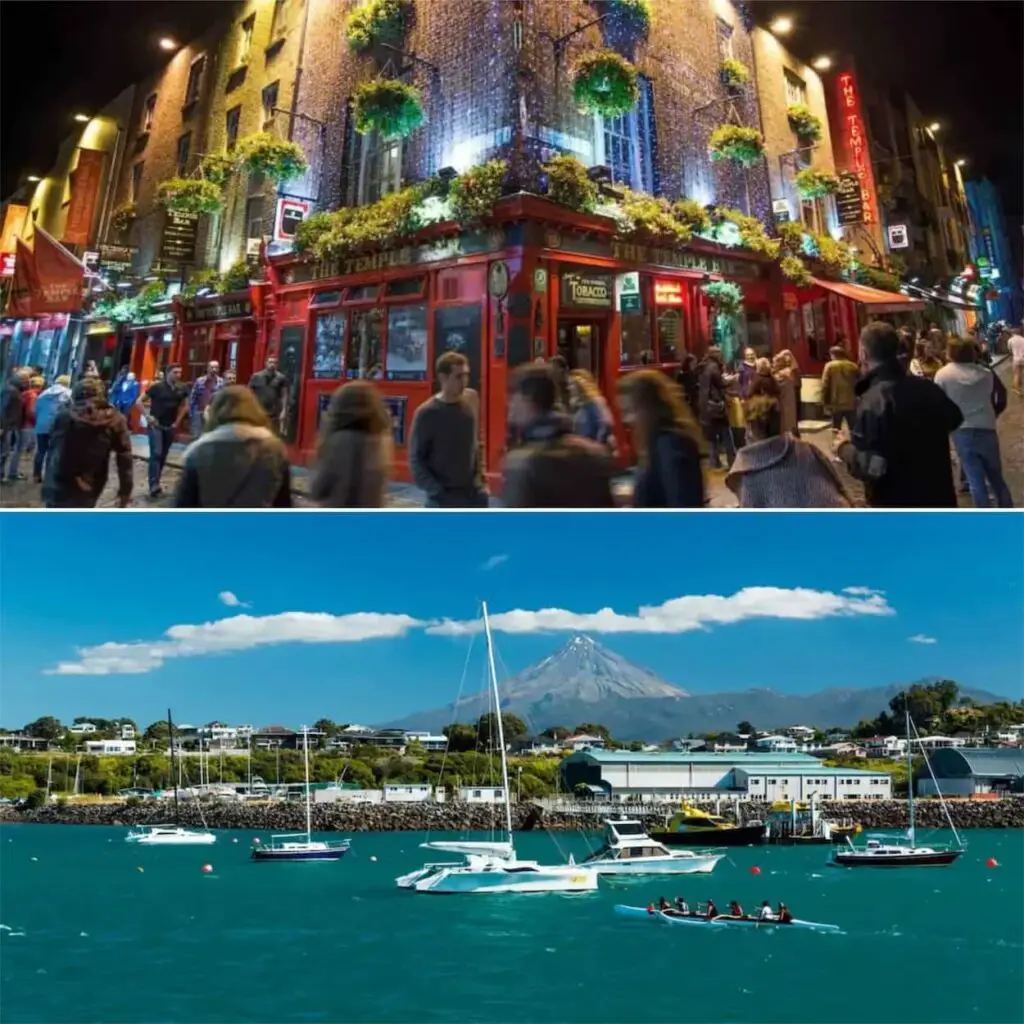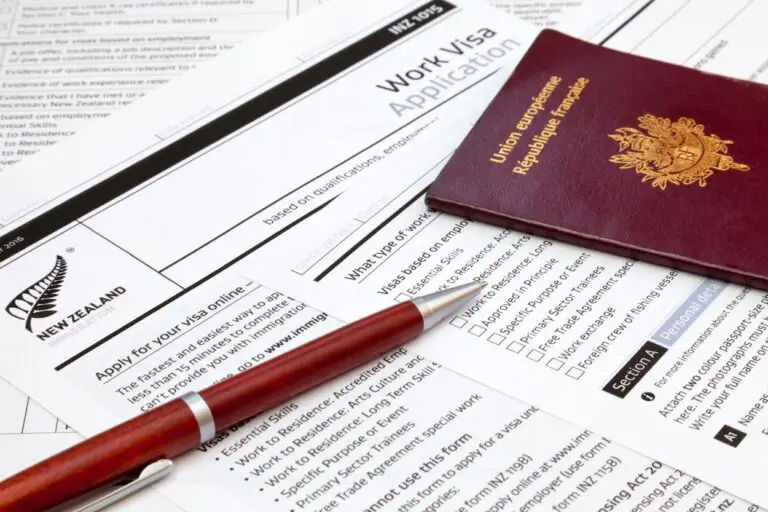Ireland vs New Zealand: Which Is Better For Living And Immigration?

Many Irish considering a move to New Zealand, while some Kiwis are relocating to the island next to the UK. There are plenty of reasons to choose one place instead of another, such as a better climate, outdoors, jobs, or quality of life.
New Zealand is a popular country for immigrants and expats, especially from the UK and other European countries. At the same time, Ireland is one of the best countries to live in in Europe due to the English language, job opportunities, and high salaries. The biggest differences between Ireland and New Zealand are the climate, jobs, salaries, and, of course, location.
Are you deciding between moving to Ireland vs New Zealand or maybe you are thinking of relocating from Ireland to New Zealand? Then you are in the right place. In this article, we discuss exactly this, which country is better for living, far away, New Zealand or your probably next door Ireland.
Also read our comprehensive guide about living in New Zealand vs UK.
Pros and cons of living in New Zealand
Pros
- Beautiful nature and landscape
- Laid back lifestyle
- A lot of space
- Various travel opportunities within the country
- Beautiful beaches and mountains – perfect for outdoors
- Temperate (pleasant) climate with a lot of sunshine
- Diversity within one country
- International environment – immigrant country
- Open-minded and welcoming people
- Free healthcare
- Decent salaries
- Great work-life balance
- Long paid leave
- Very kids friendly
- Great environment for families
- Affordable education
- Empty roads
- Friendly people
- Remote
Cons
- High cost of living
- Not many large cities
- Remote location
- Low-quality and expensive housing
- High home prices
- Lack of infrastructure like public transport
- Not salaries
- Limited career opportunities for some occupations
- Lack of history, culture, architecture
- Dangerous sun
- Tall Poppy Syndrome
- Possible earthquakes and volcano eruptions
Pros and cons of living in Ireland
Pros
- Traveling is cheap and fast
- High salaries
- Good location, close to Europe
- Great public transportation
- Solid, well-built houses
- Great job opportunities for various professionals
- Huge pub culture
- Long history and cultural heritage
- Various festivals and celebrations
- Beautiful landscapes
- Some of the best universities in the world
- EU country, which makes it easy for EU citizens to work without a visa
- Free public healthcare
- Mild winters
- English speaking
- Large job market, especially in Dublin
- Beautiful countryside
- Lovely people
- Easy to travel from Ireland
Cons
- High cost of living
- Pretty bad weather – rainy and cold
- Dark and cold winters
- High housing prices
- Isolated from Europe
- Salaries aren’t very high
- Northern Ireland is not a part of the EU but is actually part of the UK
- But it takes a long time to be seen and has many costs
- Costs of health insurance or private care
- Mild summers
- Vast weather changes daily
- High rental costs for subpar accommodations
Let’s look closer at both of these countries and the main similarities vs differences between them.
Ireland vs New Zealand: country comparison
Here is a general comparison of both places to give you a quick overview:
| Ireland | New Zealand | |
|---|---|---|
| Area | 70,280 km² | 267,710 km² |
| Population | 5,023,109 | 5,123,000 |
| Population density/km² | 71.6 | 19.1 |
| Life expectancy male/female | 80/84 | 80/84 |
| Average age | 37.8 years | 37.2 years |
| Total GDP | $560 billion | $233 billion |
| GDP per capita | $104,589 | $48,317 |
| Climate (0 bad, 100 excellent) | 2 | 36 |
| Health (0 bad, 100 excellent) | 82 | 81 |
| Unemployment rate | 4,5% | 3,2% |
| Average cost of living | US$2,991 | US$2,693 |
| Average income | US$76,110 | US$45,340 |
| Daytime temperatures | 13.2 °C | 17.4 °C |
| Sunshine hours per day (average) | 3,8 | 5,8 |
| Rain days per month | 14,6 | 10,6 |
Main differences between New Zealand vs Ireland

The main difference between these countries is probably the size, New Zealand is about 3.8 times larger than Ireland, although they both have very similar population numbers.
On the other hand, Ireland pays better salaries and has a larger economy. Hence, job opportunities are generally better in Ireland. In both countries, the people are super friendly and welcoming to foreigners.
New Zealand is more of a provincial country with a relaxed lifestyle. It’s much more peaceful and has far easier access to the outdoors.
But Irish pub culture is legendary, and people prefer to spend time there instead of hiking the nearest hill.
The second significant difference between both is the climate, Ireland is very rainy and is cooler. Summer in New Zealand is amazing, it’s not very hot, while Ireland never gets warm enough weather in summer.
The location of both countries is also vastly different, so you can fly to anywhere from Ireland, and flights to Europe are incredibly affordable.
In New Zealand, you have very limited travel options, and if you go somewhere, it will cost a fortune, plus you spend a day just travelling. A flight to neighbouring Australia is at least 3 hours.
Immigration to New Zealand vs Ireland
New Zealand
New Zealand relies on immigrants for labor reasons, so immigration laws are pretty reasonable.
Possible immigration ways include:
- Skilled Migrant visa
- Straight to residence visa
- Student visa
- Business visa
- Partner visa
- Talent work visa
Read more about visas on the Immigration New Zealand website.
For work and residency visas, New Zealand has a scoring system, where you need to collect at least 180 points to express your interest in permanent residency. if you want to apply for a work visa. There are various visa types available.
There is also a working holiday visa, a great way to spend a year or two in the country if you are aged between 18-30. You can work and travel as much as you want during this time period.
For international students, New Zealand offers a post-study work visa. The duration of this visa correlates with the duration of the program that you have studied, but for Master’s degrees, it’s 3 years.
Ireland
Ireland is also a popular destination for immigrants from around the world. Many choose to study in this country as a way to move there.
Generally, non-EEA citizens will need a visa to enter and live in Ireland. Residents of some countries, like the USA, or Canada, don’t need a visa for a stay of up to 90 days.
Irish visas are categorized into short-term ones, type C, and long-term visas, type D. To stay long-term in Ireland, you should apply for one of these visas:
- Residency
- Business Visa
- Work Visa
- Study Visa
- Family Visa
To get a work visa, you logically would need a job offer in Ireland as well as an employment permit. There is a range of various employment permits depending on your situation, but the most common is probably a Critical Skills Employment Permit, General Employment Permit, and Intra-Company Transfer Permit.
Ireland also has a post-study work visa that is preferred among many international studies. The duration of such a visa is, however, shorter than in New Zealand – up to 2 years and even less if you have completed a Bachelor’s degree – 12 months.
Check out the official website of the Department of Foreign Affairs of Ireland.
In conclusion, I would say, it’s easier to immigrate to New Zealand than to Ireland. Yet, it’s my opinion, and I am not an immigration adviser.
Only a qualified specialist can tell you exactly which immigration laws apply to your case. In New Zealand, check out New Zealand Shores.
Quality of life
To understand more about the quality of life, we compare the results of the international Better Life Index from the OECD. They rank countries across the world according to several factors like housing, income, environment, and much more.
Here is the data for both countries.
New Zealand
Overall, New Zealand ranks 10th worldwide for the quality of life, scoring highly for economic and political stability, safety, and the quality of its education system.
Below you can see the quality of life indicators for New Zealand. The maximum score is 10; the higher the number, the better.
- Housing: 6,8
- Income: 6,0
- Jobs: 8,3
- Community: 8,5
- Education: 7,0
- Environment: 8,1
- Civic engagement: 7,5
- Health: 9,2
- Life satisfaction: 7,9
- Safety: 7,3
- Work-life balance: 4,9
Auckland was ranked 3rd in the Mercer Quality of Life index. The capital of New Zealand, Wellington, scored 15th. Dublin, the capital of Ireland, is on place 33 in the same ranking.
This ranking considers things like the environment, political stability, health, weather, housing, and other factors.
Furthermore, Wellington is ranked 56 according to Numbeo’s quality of life scores. Irish Cork comes at place 62, not that far away from New Zealand.
Consequently, quality of life, all factors considered, is higher in New Zealand than in Ireland.
From a general perspective, New Zealand does great in factors like natural beauty & nature, weather, healthcare, political stability, cultural diversity, tolerance of other races & cultures, and the amount of pollution.
Moreover, New Zealand outperforms in average income, jobs, education, life satisfaction, health, environmental quality, civic engagement, and life satisfaction. New Zealanders give a 7.3 grade regarding their general satisfaction with life.
At the same time, Ireland has higher wages or better opportunities to earn a higher salary, a stronger economy, a lot of opportunities to travel, endless culture, and a long history.
Moreover, the country has no shortage of exports and imports; you can quickly and cheaply get anything you will ever need or want.
In New Zealand, the average household net-adjusted disposable income per capita is 39,024 USD yearly, more than the OECD average of 30,490 USD.
Learn more about the qualify of life in New Zealand in our YT video:
Environment
Only a few countries can beat New Zealand in terms of the environment. The air only has a PM2.5 level of 6 micrograms per cubic meter. It’s one of the lowest levels in the OECD, with an average of 14 mg.
Ireland is also a very clean place with a level of PM2.5 averaging 7.8 micrograms per cubic meter. It’s also below the OECD average of 14 micrograms.
Ireland
Below you can see how Ireland scores in quality of life according to the OECD (the maximum score is 10; the higher the number, the better):
- Housing: 7,4
- Income: 4,1
- Jobs: 8,1
- Community: 8,9
- Education: 7,6
- Environment: 7,1
- Civic engagement: 2,9
- Health: 9,2
- Life satisfaction: 7,2
- Safety: 8,3
- Work-life balance: 6,2
Ireland has higher scores than New Zealand for housing, education, and work-life balance.
In Ireland, you have a lower average net income than in New Zealand, mainly because housing is very pricey in Ireland. That said, the average household net disposable income for the Irish is only US$29,488 a year, while it’s vs US$39,024 in New Zealand.
About 68% of people aged 15 to 64 in Ireland have a paid job, which is lower than in New Zealand.
Overall life satisfaction among people living in Ireland is 7 grade on average, higher than the OECD average of 6.7.
Wages

According to official statistics of Ireland, the average weekly earnings in Q2 2022 were 871 EUR (US$922) for full-time workers. That comes to about US$3,688 per month and US$44,256 per year. It’s an increase of 2.4% from Q2 2021.
The highest average hourly wages have been seen in the Information & Communication sector with a rate of 48.39 EUR. Other highly paid fields include Financial, Insurance & Real Estate services with a pay of 45.72 EUR per hour.
On the other hand, professionals in Accommodation & Food Services earn the least, about 14.72 EUR per hour.
In New Zealand, in 2022, the average salary was NZ$63,360 or US$39,052. As a result of this data, national average salaries are higher in Ireland.
Generally, you can expect slightly higher average salaries in Ireland; however, the cost of housing is also higher.
New Zealand
In 2023, the minimum wage is NZ$21,20 per hour; it will be increased to NZ$23 from April 2023. The median income was about NZ$29.66 per hour as of June 2022 (NZ$1,189 per week based on a 40-hour week).
A really good annual salary in New Zealand is approximately between NZ$80,000 (US$49,308) and NZ$110,000 (US$67,799) before the deduction of taxes. Read our guide on salaries in New Zealand.
This accounts for a net per month of NZ$5,126 (US$3,159) and NZ$6,764 (US$4,169). If you live alone or with a family, this salary can satisfy all the most common needs and leave some pleasures and leisures.
This salary will also be enough if you have a family and live in an expensive city (like one of these).
Certainly, the salaries vary with varying occupations. However, the average salary (across all fields) in New Zealand as of 2022 was around NZ$58,836 (US$37k) per year.
In order to make an accurate estimate of the salary, keep in mind that a median income is about NZ$29.66 per hour (June 2022), which basically accounts for NZ$56,947 per annum based on a 40-hour week. Also, the minimum wage is set at NZ$21,20 per hour (in 2023).
On average, people in New Zealand earn about US$45,269 per year (NZ$70,789), which is less than the OECD average of US$49,165.
At the same time, the net income in the average household is about US$39,024 (NZ$61,023) annually, which is higher than in Ireland (US$29,488).
With salaries all clear, but how much do you need to make to live comfortably in such an expensive place like New Zealand? According to our estimations, you would need at least NZ$50,000 (US$30,818) to live in any city.
Below you can see a median wage in various industries in New Zealand (NZ$):
| Sector | Median pay | Salary range |
|---|---|---|
| Accounting | $65,000 | $48,000 to $125,000 |
| Agriculture, fishing and forestry | $55,000 | $40,000 to $95,000 |
| Architecture | $75,000 | $50,000 to $125,000 |
| Automotive | $60,000 | $40,000 to $85,000 |
| Banking, finance and insurance | $65,000 | $45,000 to $125,000 |
| Construction and roading | $60,000 | $40,000 to $135,000 |
| Customer service | $48,000 | $40,000 to $65,000 |
| Education | $60,000 | $42,000 to $75,000 |
| Engineering | $75,000 | $48,000 to $130,000 |
| Executive and general management | $85,000 | $48,000 to $195,000 |
| Government and council | $70,000 | $40,000 to $145,000 |
| Healthcare | $55,000 | $40,000 to $85,000 |
| Hospitality and tourism | $50,000 | $40,000 to $65,000 |
| HR and recruitment | $65,000 | $48,000 to $122,000 |
| Information technology (IT) | $105,000 | $50,000 to $200,000 |
| Legal | $65,000 | $45,000 to $125,000 |
| Manufacturing and operations | $48,000 | $40,000 to $75,000 |
| Marketing, media and communications | $70,000 | $45,000 to $135,000 |
| Office and administration | $50,000 | $42,000 to $75,000 |
| Property | $85,000 | $50,000 to $150,000 |
| Retail | $48,000 | $40,000 to $65,000 |
| Sales | $65,000 | $42,000 to $115,000 |
| Science and technology | $65,000 | $42,000 to $115,000 |
| Trades and services | $55,000 | $40,000 to $85,000 |
| Transport and logistics | $50,000 | $40,000 to $80,000 |
Ireland
What about salaries in Ireland? Since 1 January 2023, the national minimum wage is 11.30 EUR (US$11,97) per hour; it’s lower than in New Zealand (US$14,18).
The average salary in Ireland nationwide is 44,202 EUR (US$46,821) per year – higher than in New Zealand. While the average net disposable income of an Irish household is only US$29,488 per year.
Wages are significantly higher in Dublin, but rent is expensive there. Here are some examples of typical salaries in Dublin, Ireland:
| Job title | Median salary (US$) |
|---|---|
| C LEVEL EXECUTIVE | $98,961 |
| PRODUCT MANAGER | $66,347 |
| FINANCE MANAGER | $59,892 |
| HARDWARE ENGINEER | $57,723 |
| IT MANAGER | $56,103 |
| PROJECT MANAGER | $55,175 |
| MOBILE DEVELOPER | $54,921 |
| PHYSICIAN | $54,394 |
| LECTURER | $52,746 |
| UX DESIGNER | $51,364 |
| SALES MANAGER | $50,169 |
| DENTIST | $50,111 |
| DATA SCIENTIST | $49,851 |
| MARKETING MANAGER | $49,787 |
| ACCOUNT MANAGER | $48,299 |
| RESEARCH SCIENTIST | $47,511 |
| BUSINESS DEVELOPMENT | $47,285 |
| PHARMACIST | $44,933 |
| SOFTWARE ENGINEER | $44,777 |
| ACCOUNTANT | $44,287 |
| BUSINESS ANALYST | $43,541 |
| CHEMICAL ENGINEER | $42,968 |
| HUMAN RESOURCES MANAGER | $42,854 |
| OPERATIONS MANAGER | $42,518 |
| QA ENGINEER | $41,365 |
| FINANCIAL ANALYST | $41,180 |
| SYSTEMS ADMINISTRATOR | $40,243 |
| MECHANICAL ENGINEER | $39,971 |
| ELECTRICAL ENGINEER | $39,332 |
| DATA ANALYST | $39,026 |
| COPYWRITER | $37,773 |
| WEB DEVELOPER | $37,771 |
| CIVIL ENGINEER | $37,493 |
| ARCHITECT | $36,587 |
| EXECUTIVE ASSISTANT | $36,560 |
| NURSE | $36,069 |
| WEB DESIGNER | $35,056 |
| POSTDOCTORAL RESEARCHER | $33,710 |
| CONTENT MARKETING | $33,446 |
| ATTORNEY | $32,916 |
| GRAPHIC DESIGNER | $32,317 |
| CUSTOMER SUPPORT | $31,523 |
| OFFICE MANAGER | $30,354 |
| TEACHER | $29,904 |
| CHEF | $28,538 |
| INTERIOR DESIGNER | $28,425 |
| ADMINISTRATIVE ASSISTANT | $27,422 |
| RECEPTIONIST | $22,722 |
| FASHION DESIGNER | $19,530 |
| INDUSTRIAL DESIGNER | $18,257 |
| CASHIER | $17,992 |
| WAITER | $17,258 |
To have a comfortable lifestyle as a single in Ireland, you are looking at a net income between 2,800 EUR (US$2,965) and 3,500 EUR (US$3,707) per month because an estimated cost of living for a single living in Dublin is 3,337 EUR (US$3,534) per month.
Taxes
Where do people pay more taxes in Ireland or New Zealand? Luckily, Ireland isn’t your typical European country where you spend half of your income on taxes.
New Zealand
In 2023, the following income tax rates apply for salaries earned in New Zealand:
| Salary (NZ$) | Tax rate |
|---|---|
| Up to $14,000 | 10.5% |
| Over $14,000 and up to $48,000 | 17.5% |
| Over $48,000 and up to $70,000 | 30% |
| Over $70,000 and up to $180,000 | 33% |
| Remaining income over $180,000 | 39% |
That said, with an average salary of US$55,788 in Auckland, your net annual income will be US$45,217 or US$3,768 monthly. Hence, you paid only 18.95% in taxes.
Ireland
The tax structure in Ireland is different and has European principles where your tax rate depends on your family status. In 2023, the following tax rates apply to employees in Ireland in EUR:
| Filing status | Tax rate 20% | Tax rate 40% |
|---|---|---|
| Single and widowed person: no dependent children | Income up to 40,000 | Balance over 40,000 |
| Married couple: one income | Income up to 49,000 | Balance over 49,000 |
| Married couple: two incomes | Income up to 80,000 | Balance over 80,000 |
On average, a single 28 years old employee earning 60,000 EUR gross per year pays 16,797 EUR in taxes (27,9%) in 2023. In New Zealand, you would have paid 25,7% in taxes on the same salary. Overall, income taxes are higher in Ireland than in New Zealand.
Job opportunities

Thanks to its location, Ireland has a larger economy, hence, more job opportunities. The isolation of New Zealand makes the country very limited when it comes to jobs and international trade.
New Zealand
According to an OECD report, about 77% of employable people in New Zealand have a job. Around 14% of employees work long hours, which is higher than in Ireland. That said, New Zealand’s work-life balance is still legendary.
New Zealand’s government expects we’ll need about 47,000 more workers a year in the near future. That adds up to great career opportunities.
The majority of the new jobs will be in highly skilled occupations, and it’s expected most will have to be filled by people from overseas countries – including Ireland.
Prospects are particularly strong if your skills are on the Green list, but if not, don’t be disheartened. There are lots of opportunities in New Zealand for people with skills.
Most in-demand skills
Some professional areas have a higher demand for workers, so there are many job openings in the construction industry, healthcare, education, and IT. Handy, qualified people and teachers have great prospects in New Zealand.
Also, demand ranges depending on the location within the country. In Auckland, almost any qualified worker can find a job.
But there are opportunities in other places, too, particularly in the Waikato (Hamilton), Bay of Plenty, Wellington, and across the South Island.
Moreover, foreign candidates have the best chances of employment in the following industries:
- Healthcare and social services
- Construction, various trades, and infrastructure
- Education
- Engineering
- ICT, electronics and telecommunications
- Agriculture and forestry
New Zealand’s job market depends on experience and skills rather than qualifications and degrees. Job culture over there is open-minded and accepts anyone fulfilling the criteria regardless of your nationality.
Ireland
Ireland has a large labor market with the largest demand for IT workers, engineers, financial specialists, healthcare workers, and scientists.
About 68% of people in Ireland have a job, which is less than in New Zealand.
Overall, handy skilled workers have better opportunities in New Zealand. That said, foreign workers and expats have the best chances in areas with skill shortages, which include but are not limited to:
- Business and finance – accountants, business intelligence analysts, financial advisers, risk and compliance professionals
- Engineering – biomedical engineers, chemical engineers, electrical engineers, energy engineers
- IT – app developers, data analysts, software developers, IT support specialists, programmers
- Healthcare – doctors, nurses, pharmacists, opticians, radiologists, health managers and directors
- Hospitality – chefs
- Natural and social science professionals – scientists in food manufacturing and medical laboratory scientists.
As you can see, Ireland has a wide variety of jobs available; hence, people with almost any qualifications can work there. On the other hand, you must have a particular skill or trade to work in New Zealand.
Cost of living
Well, both countries are very expensive to live in. Some things are cheaper in New Zealand, some in Ireland. Ireland ranked 6th vs 20th for New Zealand in the list of the most expensive countries in the world.
Both countries are very similar when it comes to the cost of living. The main difference is that you will pay significantly more for rent in Ireland (28,5%) but will spend more on groceries in New Zealand (24.1%).
| Consumer prices in New Zealand are 1.3% higher than in Ireland |
| Rent in New Zealand is 28.5% lower than in Ireland |
| Restaurant prices in New Zealand are 7.0% lower than in Ireland |
| Groceries in New Zealand are 24.1% higher than in Ireland |
| However, local purchasing power in New Zealand is 12.3% higher than in Ireland |
| All prices are in US$ | Ireland | New Zealand |
|---|---|---|
| Cost of living Family | $4,821 | $4,016 |
| One person rent | $1,427 | $1,200 |
| Family rent | $2,366 | $1,685 |
| Food expenses | $508 | $498 |
| Transport expenses | $128 | $143 |
| Monthly salary after tax | $3,010 | $3,113 |
| GDP per capita | $100K | $48,781 |
Food and eating out
| All prices are in US$ | Ireland | New Zealand |
|---|---|---|
| Lunch | $15.90 | $15.21 |
| Dinner in a restaurant | $84 | $70 |
| Fast food meal | $9.54 | $8.63 |
| Beer in a bar | $5.83 | $6.16 |
| Cappuccino | $3.64 | $3.29 |
| Pepsi / Coke | $2.08 | $2.24 |
| Food item | Ireland | New Zealand |
|---|---|---|
| Milk | $1.25 | $1.84 |
| White Bread | $1.78 | $1.87 |
| Eggs | $3.20 | $4.53 |
| Local Cheese | $8.77 | $8.79 |
| Chicken Fillets | $9.21 | $8.98 |
| Beef Round | $10.71 | $13.93 |
| Apples | $2.44 | $2.72 |
| Tomato | $2.89 | $6.13 |
| Potato | $1.70 | $2.06 |
| Lettuce | $1.02 | $2.62 |
| Domestic Beer | $2.76 | $3.13 |
Housing costs
| All costs are in US$ | Ireland | New Zealand |
|---|---|---|
| 1-bedroom apartment, city center | $1,523 | $1,107 |
| 3-bedroom house, city center | $2,650 | $1,865 |
| Utility | $201 | $133 |
| Internet | $54.74 | $52.47 |
| Mortgage interest rate | 3.41% | 4.51% |
| House price, city center, m2 | $4,993 | $5,695 |
Others
| All costs are in US$ | Ireland | New Zealand |
|---|---|---|
| Gym | $47.05 | $60 |
| Kindergarten | $1,094 | $745 |
| Gas | $1.98 | $1.73 |
| Monthly pass public transport | $115.25 | $101.05 |
| Toyota Corolla Sedan new | $31,153 | $20,813 |
Auckland vs Dublin
However, the majority of people who move to New Zealand from abroad, live in Auckland, while in Ireland, it’s Dublin. So, it would be wise to compare the cost of living in these cities.
In total, Dublin is only 2.1% more expensive than Auckland. Besides, in Dublin, eating out is 2,6% less expensive than in Auckland. Groceries are 22.5% CHEAPER in Dublin than in Auckland!
However, housing prices in Ireland are insane. You will pay 32.6% more for your rent in Dublin than in Auckland.
New Zealand
So, to live alone and independently in the country’s largest city Auckland, you should have at least NZ$4,787 (US$2,950) monthly to cover the main expenses. A family of four requires around NZ$8,535 (US$5,260) per month to live comfortably.
Read the full guide on the cost of living in New Zealand.
For rent, you can expect to pay anything from NZ$650 per week or NZ$2,600 (1,500 EUR) per month to rent a two-bedroom house in an okay suburb. Bills aren’t included.
Yet, renting an entire house in New Zealand is still cheaper than a flat in Ireland. Insane!
Ireland
In Ireland, the recommended budget to live on is 5,571 EUR (US$5,901) for a family of four and 3,327 EUR (US$3,524) for a single person per month in 2023. You can definitely live on less in smaller towns.
Here is a breakdown of typical expenses when living in Dublin as a single:
- Rent: 1,970 EUR per month – one-bedroom apartment in the city center
- Basic utilities: 229 EUR
- Internet: 57 EUR
- Basic public transport monthly ticket: 120 EUR
- Chicken fillets kg: 9.37 EUR
- Dinner for two in a good restaurant pub: 80 EUR
- A simple meal: 20 EUR
- 1 cocktail in a club: 12 EUR
- A cappuccino: 3,7 EUR
- 1 pint of beer: 6 EUR
Rent in Dublin is, on average, 56.5% higher than in Auckland. Food in the supermarket is cheaper in Ireland than in New Zealand. Rent is the heaviest item on the list of living expenses.
Availability of services and products
Due to the location of New Zealand, imported goods are very pricey and in shortage. You almost definitely will get a better deal in Ireland.
Besides, the population of New Zealand is too small to have all the services and products. There isn’t enough demand for companies to supply. Hence, it doesn’t make sense financially.
Climate and weather

New Zealand has a temperate climate, which means it’s never very hot, and it’s never very cold. Generally, the weather is very pleasant, that’s why also so many Europeans are moving here.
The average temperature on the North Island ranges between 10°C and 25°C throughout the year. The south island is cooler, with averages from 5°C to 25°C.
Overall, summers are warm and dry from December to February. Winters are mild but also wet in some areas, from June to August. You can experience a bit of snow and freezing temperatures on the South Island of New Zealand.
In addition, New Zealand is a very sunny place, many cities receive over 2,000 hours of sunshine. City Nelson, on the South Island, is the sunniest place, with more than 2,472 hours of sunshine per year!
Ireland isn’t known to have great weather, and rightly so. In contrast to New Zealand, Ireland has an oceanic climate, which is cloudy and rainy most times of the year. Besides, Ireland receives way less sunshine hours:
- About 1,300 hours a year in the west
- 1,450 hours in Dublin
- Up to 1,550 hours on the south-east coast
Summers are pretty cool, with an average of 18°C to 20°C and a maximum of 25°C in some areas. Winter is also not cold over there, the average temperature is about 6 – 8°C. See more on the weather below (Dublin):
| Month | Min (°C) | Max (°C) | Mean (°C) |
|---|---|---|---|
| January | 2 | 8 | 5.3 |
| February | 2 | 9 | 5.4 |
| March | 3 | 10 | 6.4 |
| April | 4 | 12 | 8.1 |
| May | 6 | 15 | 10.7 |
| June | 9 | 18 | 13.4 |
| July | 11 | 19 | 15.2 |
| August | 11 | 19 | 15 |
| September | 9 | 17 | 13 |
| October | 7 | 14 | 10.2 |
| November | 4 | 10 | 7.3 |
| December | 3 | 9 | 5.6 |
| Year | 6 | 13.4 | 9.65 |
Nature and outdoors

Regarding nature, both places are incredibly beautiful. The scenery is stunning. New Zealand differentiates by its high mountains, and it also has some giant glaciers. Ireland has sheer cliffs, rolling green hills, and giant causeways.
However, hands down, New Zealand is more scenic and offers better outdoor activities than Ireland. The latter is just way to cold to do anything besides sipping a beer in a bar.
Moreover, in New Zealand, you can find everything from beaches, forests, mountains, rivers, and volcanoes, to even fjords.
However, Ireland is also renowned for its landscape, especially compared to other European countries. Irish coastlines and cliffs are some of the most picturesque you will ever see. Yet, it’s a bit cool for swimming, but you can do it in the summer.
In Dublin, for example, you can enjoy some natural sites like the Liffey River and Phoenix Park.
So, it can be difficult to judge which place has it better in terms of nature, but New Zealand is a much, much better place to embrace the outdoors.
Best cities to live
Unlike the common belief, Auckland isn’t the best city to live in in New Zealand. There are much better options out there, including:
- Wellington
- Christchurch
- Dunedin
- Queenstown
- Tauranga
- Napier
- Taupo
- Nelson
In Ireland, most expats move to Dublin due to its size, location, and opportunities, however, there are other options too. Following Irish cities also known for a good quality of life and vibrant culture:
- Cork
- Galway
- Limerick
Also read: Living in Canada vs New Zealand.





![New Zealand vs UK: Which Country Is Better For Living? [2024]](https://simplenewzealand.com/wp-content/uploads/2023/01/andreas-sjovall-ZZUPu8ARD8U-unsplash-768x432.jpg)
![Why Are People Leaving New Zealand? [2024]](https://simplenewzealand.com/wp-content/uploads/2023/03/romain-v-ndfQe4ZR_qg-unsplash-1-768x513.jpg)
![Moving To New Zealand as a US Citizen: How To Guide [2024]](https://simplenewzealand.com/wp-content/uploads/2023/04/Blank-2-Grids-Collage-copy-1-768x768.jpg)